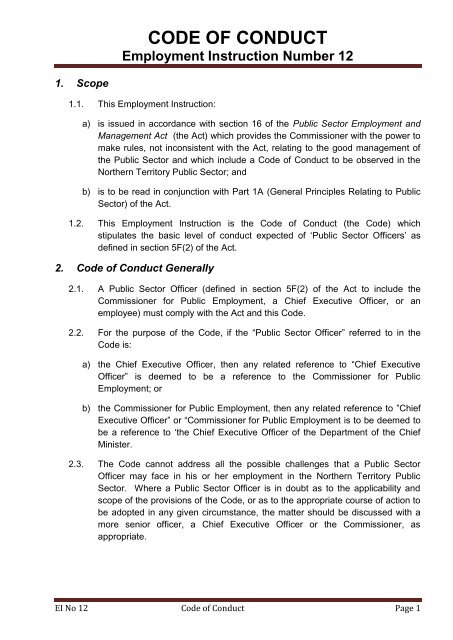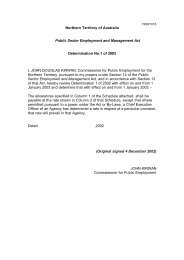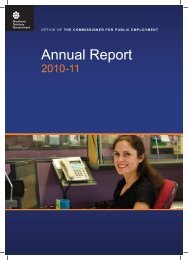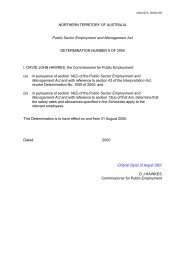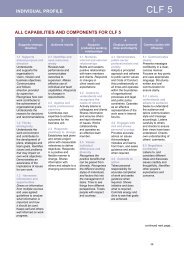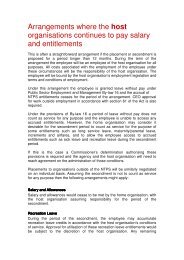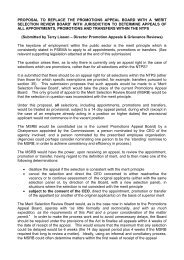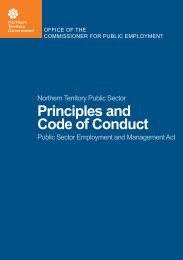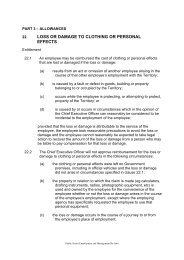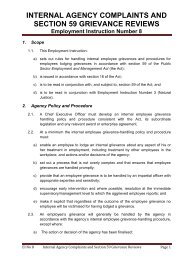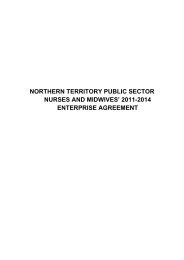Code of Conduct - Office of the Commissioner for Public Employment
Code of Conduct - Office of the Commissioner for Public Employment
Code of Conduct - Office of the Commissioner for Public Employment
Create successful ePaper yourself
Turn your PDF publications into a flip-book with our unique Google optimized e-Paper software.
CODE OF CONDUCT<strong>Employment</strong> Instruction Number 121. Scope1.1. This <strong>Employment</strong> Instruction:a) is issued in accordance with section 16 <strong>of</strong> <strong>the</strong> <strong>Public</strong> Sector <strong>Employment</strong> andManagement Act (<strong>the</strong> Act) which provides <strong>the</strong> <strong>Commissioner</strong> with <strong>the</strong> power tomake rules, not inconsistent with <strong>the</strong> Act, relating to <strong>the</strong> good management <strong>of</strong><strong>the</strong> <strong>Public</strong> Sector and which include a <strong>Code</strong> <strong>of</strong> <strong>Conduct</strong> to be observed in <strong>the</strong>Nor<strong>the</strong>rn Territory <strong>Public</strong> Sector; andb) is to be read in conjunction with Part 1A (General Principles Relating to <strong>Public</strong>Sector) <strong>of</strong> <strong>the</strong> Act.1.2. This <strong>Employment</strong> Instruction is <strong>the</strong> <strong>Code</strong> <strong>of</strong> <strong>Conduct</strong> (<strong>the</strong> <strong>Code</strong>) whichstipulates <strong>the</strong> basic level <strong>of</strong> conduct expected <strong>of</strong> „<strong>Public</strong> Sector <strong>Office</strong>rs‟ asdefined in section 5F(2) <strong>of</strong> <strong>the</strong> Act.2. <strong>Code</strong> <strong>of</strong> <strong>Conduct</strong> Generally2.1. A <strong>Public</strong> Sector <strong>Office</strong>r (defined in section 5F(2) <strong>of</strong> <strong>the</strong> Act to include <strong>the</strong><strong>Commissioner</strong> <strong>for</strong> <strong>Public</strong> <strong>Employment</strong>, a Chief Executive <strong>Office</strong>r, or anemployee) must comply with <strong>the</strong> Act and this <strong>Code</strong>.2.2. For <strong>the</strong> purpose <strong>of</strong> <strong>the</strong> <strong>Code</strong>, if <strong>the</strong> “<strong>Public</strong> Sector <strong>Office</strong>r” referred to in <strong>the</strong><strong>Code</strong> is:a) <strong>the</strong> Chief Executive <strong>Office</strong>r, <strong>the</strong>n any related reference to “Chief Executive<strong>Office</strong>r” is deemed to be a reference to <strong>the</strong> <strong>Commissioner</strong> <strong>for</strong> <strong>Public</strong><strong>Employment</strong>; orb) <strong>the</strong> <strong>Commissioner</strong> <strong>for</strong> <strong>Public</strong> <strong>Employment</strong>, <strong>the</strong>n any related reference to ”ChiefExecutive <strong>Office</strong>r” or “<strong>Commissioner</strong> <strong>for</strong> <strong>Public</strong> <strong>Employment</strong> is to be deemed tobe a reference to „<strong>the</strong> Chief Executive <strong>Office</strong>r <strong>of</strong> <strong>the</strong> Department <strong>of</strong> <strong>the</strong> ChiefMinister.2.3. The <strong>Code</strong> cannot address all <strong>the</strong> possible challenges that a <strong>Public</strong> Sector<strong>Office</strong>r may face in his or her employment in <strong>the</strong> Nor<strong>the</strong>rn Territory <strong>Public</strong>Sector. Where a <strong>Public</strong> Sector <strong>Office</strong>r is in doubt as to <strong>the</strong> applicability andscope <strong>of</strong> <strong>the</strong> provisions <strong>of</strong> <strong>the</strong> <strong>Code</strong>, or as to <strong>the</strong> appropriate course <strong>of</strong> action tobe adopted in any given circumstance, <strong>the</strong> matter should be discussed with amore senior <strong>of</strong>ficer, a Chief Executive <strong>Office</strong>r or <strong>the</strong> <strong>Commissioner</strong>, asappropriate.EI No 12 <strong>Code</strong> <strong>of</strong> <strong>Conduct</strong> Page 1
3. Issuing <strong>of</strong> Agency Specific <strong>Code</strong> <strong>of</strong> <strong>Conduct</strong> or guidelines3.1. A Chief Executive <strong>Office</strong>r may issue an agency-specific code <strong>of</strong> conduct whichis consistent with <strong>the</strong> Act, its associated subordinate legislation, this <strong>Code</strong> andany o<strong>the</strong>r relevant legislation.4. Application <strong>of</strong> <strong>Code</strong> <strong>of</strong> <strong>Conduct</strong>4.1. This <strong>Code</strong> applies to all <strong>Public</strong> Sector <strong>Office</strong>rs. The <strong>Code</strong> is underpinned by <strong>the</strong><strong>Public</strong> Sector principles which are specified in Part 1A <strong>of</strong> <strong>the</strong> Act and set outbelow:a) Administration Management Principle;b) Human Resource Management Principle, including <strong>the</strong> Merit and <strong>the</strong> Equality <strong>of</strong><strong>Employment</strong> Opportunity Principles; andc) Per<strong>for</strong>mance and <strong>Conduct</strong> Principle.5. Familiarity with Principles5.1. A <strong>Public</strong> Sector <strong>Office</strong>r must familiarise him or herself with <strong>the</strong> <strong>Code</strong>, and <strong>the</strong>General Principles <strong>of</strong> Part 1A <strong>of</strong> <strong>the</strong> Act.6. Breach <strong>of</strong> Discipline6.1. Disregarding <strong>the</strong> <strong>Code</strong> and Part 1A <strong>of</strong> <strong>the</strong> Act, or acting in a mannerinconsistent with those principles, is a breach <strong>of</strong> discipline under section 49(a)<strong>of</strong> <strong>the</strong> Act.7. Standards7.1. In order to maintain public confidence in <strong>the</strong> integrity <strong>of</strong> <strong>the</strong> Nor<strong>the</strong>rn Territory<strong>Public</strong> Sector, a <strong>Public</strong> Sector <strong>Office</strong>r must exhibit, and be seen to exhibit <strong>the</strong>highest ethical standards in carrying out his or her duties, and must pursue, andbe seen to pursue, <strong>the</strong> best interests <strong>of</strong> <strong>the</strong> people <strong>of</strong> <strong>the</strong> Nor<strong>the</strong>rn Territory.8. Trust and Confidence8.1. It is essential <strong>for</strong> <strong>the</strong> proper working <strong>of</strong> Government that a <strong>Public</strong> Sector <strong>Office</strong>rretains <strong>the</strong> trust and confidence <strong>of</strong> his or her employer, colleagues and clientsin <strong>the</strong> manner in which he or she discharges his or her <strong>of</strong>ficial responsibilities.9. Personal and pr<strong>of</strong>essional behaviour9.1. In <strong>the</strong> per<strong>for</strong>mance <strong>of</strong> his or her duties, a <strong>Public</strong> Sector <strong>Office</strong>r must:a) exercise his or her best possible technical and/or pr<strong>of</strong>essional judgement;b) develop and maintain knowledge <strong>of</strong> his or her pr<strong>of</strong>essional field;EI No 12 <strong>Code</strong> <strong>of</strong> <strong>Conduct</strong> Page 2
c) commit time and energy to fur<strong>the</strong>ring <strong>the</strong> agency's purpose and achievements;d) be familiar with and comply with <strong>the</strong> requirements <strong>of</strong> <strong>the</strong> Act, <strong>the</strong> FinancialManagement Act and o<strong>the</strong>r legislative, industrial or administrative requirementsrelevant to his or her <strong>of</strong>ficial responsibilities;e) have regard to all <strong>of</strong>ficial guidelines concerning <strong>the</strong> per<strong>for</strong>mance <strong>of</strong> his or herassigned duties;f) provide all necessary and appropriate assistance to members <strong>of</strong> <strong>the</strong> public ando<strong>the</strong>r <strong>Public</strong> Sector <strong>Office</strong>rs;g) seek to obtain value <strong>for</strong> public money spent and avoid waste or excessive use<strong>of</strong> public resources;h) take reasonable care <strong>for</strong> his or her own, and o<strong>the</strong>rs, occupational health andsafety;i) follow reasonable directions relating to occupational health and safety;j) use relevant safety equipment provided; andk) report workplace accidents in accordance with occupational health and safetystandards and programs as soon as practicable after <strong>the</strong>y occur.10. Relationships between <strong>Public</strong> Sector <strong>Office</strong>rs and GovernmentSupport to Government <strong>of</strong> <strong>the</strong> day10.1. A <strong>Public</strong> Sector <strong>Office</strong>r must provide full support to <strong>the</strong> Government <strong>of</strong> <strong>the</strong> dayregardless <strong>of</strong> which political party or parties are in <strong>of</strong>fice.Advice to Government10.2. A <strong>Public</strong> Sector <strong>Office</strong>r is responsible <strong>for</strong> providing to Government advice whichis frank, independent, based on an accurate representation <strong>of</strong> <strong>the</strong> facts and ascomprehensive as possible. This includes setting out <strong>the</strong> advantages,disadvantages, costs and consequences <strong>of</strong> <strong>the</strong> available options and, whereappropriate, recommending a particular course <strong>of</strong> action.Implementation <strong>of</strong> Government policy10.3. A <strong>Public</strong> Sector <strong>Office</strong>r is also responsible <strong>for</strong> carrying out decisions andimplementing programs promptly, conscientiously and with full regard toGovernment policy. In implementing programs, a <strong>Public</strong> Sector <strong>Office</strong>r‟s ownvalues should not supplant those explicit or implicit in Government policy. It willbe necessary both in providing advice and in implementing programs toexercise judgement as to which facts or courses <strong>of</strong> action are most relevant orimportant. Judgement must, however, always be exercised with due regard toEI No 12 <strong>Code</strong> <strong>of</strong> <strong>Conduct</strong> Page 3
legislative requirements, Government policy or a supervisor's directions,toge<strong>the</strong>r with considerations <strong>of</strong> equity and efficiency.Contact with Minister and ministerial staff10.4. Contact between a Minister and ministerial staff is normally with <strong>the</strong> ChiefExecutive <strong>Office</strong>r. Where a Minister or ministerial staff member contacts anemployee directly, <strong>the</strong> employee must advise his or her Chief Executive <strong>Office</strong>r<strong>of</strong> <strong>the</strong> contact as soon as possible.11. Relationships between <strong>Public</strong> Sector <strong>Office</strong>rs and Members <strong>of</strong> <strong>the</strong> LegislativeAssembly11.1. Contact by Members <strong>of</strong> <strong>the</strong> Legislative Assembly who are not Ministers willusually be to make representations on behalf <strong>of</strong> a constituent or by a Member<strong>of</strong> <strong>the</strong> Opposition in relation to <strong>the</strong>ir duties as Opposition spokesperson onGovernment activities.Representations on behalf <strong>of</strong> a constituent11.2. Constituent representations must be channelled to, and/or received by, anappropriately senior <strong>Public</strong> Sector <strong>Office</strong>r who has responsibility <strong>for</strong> <strong>the</strong> subjectmatter <strong>of</strong> <strong>the</strong> representation.11.3. Written responses should, where possible, be cleared by a Chief Executive<strong>Office</strong>r prior to dispatch.11.4. Where an oral response is given, a <strong>Public</strong> Sector <strong>Office</strong>r shall ensure that alldue care is exercised in providing that response, particularly where <strong>the</strong> content<strong>of</strong> <strong>the</strong> in<strong>for</strong>mation is likely to be sensitive or constitute o<strong>the</strong>r than factualmaterial which is readily available elsewhere.11.5. If a <strong>Public</strong> Sector <strong>Office</strong>r is in any doubt about releasing in<strong>for</strong>mation, <strong>the</strong> advice<strong>of</strong> his or her Chief Executive <strong>Office</strong>r should be sought.11.6. Representations by Members <strong>of</strong> <strong>the</strong> Legislative Assembly do not confer anyprivilege or priority in dealings with agencies. In addition, a <strong>Public</strong> Sector<strong>Office</strong>r responsible <strong>for</strong> providing responses must, when contemplating release<strong>of</strong> such material, be mindful <strong>of</strong> legislation concerning <strong>the</strong> security, confidentialityor protocol governing certain categories <strong>of</strong> in<strong>for</strong>mation.Representation from an Opposition Spokesperson11.7. Opposition Spokespersons normally contact <strong>the</strong> Minister with portfolioresponsibility.11.8. In <strong>the</strong> absence <strong>of</strong> <strong>the</strong> Minister, <strong>the</strong> Spokesperson may contact a ChiefExecutive <strong>Office</strong>r. If a Spokesperson contacts a <strong>Public</strong> Sector <strong>Office</strong>r, anyEI No 12 <strong>Code</strong> <strong>of</strong> <strong>Conduct</strong> Page 4
equest must be referred back to his or her Chief Executive <strong>Office</strong>r <strong>for</strong>instructions prior to a written or oral response being provided.11.9. Fur<strong>the</strong>r, it should be noted that Opposition Spokespersons do not have a rightto access agency files and are not entitled, by virtue <strong>of</strong> <strong>the</strong>ir <strong>of</strong>fice, to beprovided with written or oral in<strong>for</strong>mation regarding future or proposed policies orstrategies.12. Relationship between <strong>Public</strong> Sector <strong>Office</strong>rs <strong>of</strong> <strong>the</strong> Legislative Assembly andMembers <strong>of</strong> <strong>the</strong> Legislative Assembly12.1. For <strong>Public</strong> Sector <strong>Office</strong>rs <strong>of</strong> <strong>the</strong> Department <strong>of</strong> <strong>the</strong> Legislative Assembly thissection takes precedence over any o<strong>the</strong>r sections in <strong>the</strong> <strong>Code</strong> which relate tocontact with Ministers and Ministerial staff, and relationships with Members <strong>of</strong> <strong>the</strong>Legislative Assembly.12.2. <strong>Public</strong> Sector <strong>Office</strong>rs <strong>of</strong> <strong>the</strong> Department <strong>of</strong> Legislative Assembly must:a) provide pr<strong>of</strong>essional advice and support <strong>for</strong> <strong>the</strong> Parliament independently <strong>of</strong> <strong>the</strong>Executive Government <strong>of</strong> <strong>the</strong> Nor<strong>the</strong>rn Territory;b) provide non-partisan and impartial advice and services to <strong>the</strong> Parliament,parliamentary committees and to all Members <strong>of</strong> <strong>the</strong> Legislative Assembly; andc) maintain appropriate confidentiality about dealings with <strong>the</strong> Parliament, withparliamentary committees and with Members <strong>of</strong> <strong>the</strong> Legislative Assembly.13. <strong>Public</strong> commentMeaning <strong>of</strong> public comment13.1. "<strong>Public</strong> comment" includes public speaking engagements (including commentson radio and television), expressing views in a letter to <strong>the</strong> press or in books orin notices, or „online‟ (e.g. social networking sites), and any o<strong>the</strong>r commentmade in circumstances where it is reasonably <strong>for</strong>eseeable that publication orcirculation <strong>of</strong> <strong>the</strong> comment will flow to <strong>the</strong> community at large.<strong>Public</strong> comment on Government matters13.2. Except where required by law, or as authorised by <strong>the</strong> responsible ChiefExecutive <strong>Office</strong>r, a <strong>Public</strong> Sector <strong>Office</strong>r must not make public comment onGovernment matters in an <strong>of</strong>ficial capacity.13.3. If authorised by <strong>the</strong> Chief Executive <strong>Office</strong>r, comments made by a <strong>Public</strong> Sector<strong>Office</strong>r must be confined to factual in<strong>for</strong>mation and must not, as far as possible,express an opinion on <strong>of</strong>ficial policy or practice unless required to do by <strong>the</strong>circumstances <strong>of</strong> <strong>the</strong> particular situation, e.g. when asked to do so in court.EI No 12 <strong>Code</strong> <strong>of</strong> <strong>Conduct</strong> Page 5
Circumstances in which public comment is inappropriate13.4. While a <strong>Public</strong> Sector <strong>Office</strong>r, as a member <strong>of</strong> <strong>the</strong> community, has <strong>the</strong> right tomake public comment and enter into public debate on political and socialissues, <strong>the</strong>re are some circumstances in which public comment isinappropriate. These include:a) <strong>the</strong> implication that <strong>the</strong> public comment, although made in a private capacity, isin some way seen to be an <strong>of</strong>ficial comment <strong>of</strong> <strong>the</strong> Government or <strong>of</strong> <strong>the</strong> <strong>Public</strong>Sector <strong>Office</strong>r‟s agency;b) where a <strong>Public</strong> Sector <strong>Office</strong>r is directly involved in advising on or directing <strong>the</strong>administration or implementation <strong>of</strong> Government policy and <strong>the</strong> public commentwould compromise his or her ability to continue to do so in an efficient andpr<strong>of</strong>essional manner; andc) where public comment, regardless <strong>of</strong> <strong>the</strong> connection (or lack <strong>of</strong> connection) witha <strong>Public</strong> Sector <strong>Office</strong>r‟s normal duties, amounts to criticism sufficiently strongor persistent to give rise to <strong>the</strong> public perception that <strong>the</strong> <strong>Public</strong> Sector <strong>Office</strong>r isnot prepared to implement or administer <strong>the</strong> policies <strong>of</strong> <strong>the</strong> Government <strong>of</strong> <strong>the</strong>day as <strong>the</strong>y relate to his or her duties.14. Use <strong>of</strong> in<strong>for</strong>mation acquired in <strong>the</strong> course <strong>of</strong> employmentDisclosure <strong>of</strong> in<strong>for</strong>mation acquired in <strong>the</strong> course <strong>of</strong> employment14.1. A <strong>Public</strong> Sector <strong>Office</strong>r must not disclose in<strong>for</strong>mation or documents acquired in<strong>the</strong> course <strong>of</strong> his or her employment, o<strong>the</strong>r than as required by law or whereproper authority has been given.Misuse <strong>of</strong> in<strong>for</strong>mation14.2. A <strong>Public</strong> Sector <strong>Office</strong>r must not misuse in<strong>for</strong>mation gained in his or her <strong>of</strong>ficialcapacity. Misuse includes, but is not limited to:a) speculation, <strong>for</strong> personal gain or o<strong>the</strong>rwise, in shares on <strong>the</strong> basis <strong>of</strong>confidential in<strong>for</strong>mation about <strong>the</strong> affairs <strong>of</strong> a business or <strong>of</strong> proposedGovernment action;b) seeking to take advantage <strong>for</strong> personal reasons or <strong>for</strong> ano<strong>the</strong>r person on <strong>the</strong>basis <strong>of</strong> in<strong>for</strong>mation about that person held in <strong>of</strong>ficial records;c) gossiping or rumour mongering on <strong>the</strong> basis <strong>of</strong> personal or o<strong>the</strong>r in<strong>for</strong>mationheld in <strong>of</strong>ficial records; andd) providing a <strong>for</strong>mer <strong>Public</strong> Sector <strong>Office</strong>r, or appearing to provide a <strong>for</strong>mer <strong>Public</strong>Sector <strong>Office</strong>r, favourable treatment or access to privileged in<strong>for</strong>mation.EI No 12 <strong>Code</strong> <strong>of</strong> <strong>Conduct</strong> Page 6
Integrity and security <strong>of</strong> documents and in<strong>for</strong>mation14.3. A <strong>Public</strong> Sector <strong>Office</strong>r must take care to maintain <strong>the</strong> integrity and security <strong>of</strong>documents or in<strong>for</strong>mation <strong>for</strong> which he or she is responsible (refer also<strong>Employment</strong> Instruction Number 9 - Employee Records).Freedom <strong>of</strong> in<strong>for</strong>mation14.4. A <strong>Public</strong> Sector <strong>Office</strong>r must ensure that <strong>the</strong> privacy <strong>of</strong> an individual ismaintained and only release in<strong>for</strong>mation in accordance with <strong>the</strong> In<strong>for</strong>mation Act.Authorisation from a Chief Executive <strong>Office</strong>r is required be<strong>for</strong>e action iscommenced.Nor<strong>the</strong>rn Territory Criminal <strong>Code</strong>14.5. The Nor<strong>the</strong>rn Territory Criminal <strong>Code</strong> contains provisions relating to <strong>the</strong> misuseand communication <strong>of</strong> confidential in<strong>for</strong>mation and o<strong>the</strong>r matters relating to a<strong>Public</strong> Sector <strong>Office</strong>r.15. Use <strong>of</strong> <strong>of</strong>ficial facilities, equipment and resources15.1. Unless a Chief Executive <strong>Office</strong>r grants permission, <strong>of</strong>ficial facilities andequipment, e.g. telephones, facsimiles, photocopiers, computers must not beused <strong>for</strong> non-government or private purposes.15.2. In granting such permission, a Chief Executive <strong>Office</strong>r must have regard to <strong>the</strong>risk <strong>of</strong> exposing <strong>the</strong> agency to potential legal liabilities which could result from<strong>the</strong> private use <strong>of</strong> facilities or equipment by a <strong>Public</strong> Sector <strong>Office</strong>r.15.3. If permission is granted to use <strong>of</strong>ficial facilities, equipment and resources <strong>the</strong>equipment must be used in accordance with <strong>the</strong> applicable Nor<strong>the</strong>rn Territory<strong>Public</strong> Sector policies or standards concerning <strong>the</strong> use <strong>of</strong> Government facilitiesand equipment.15.4. A <strong>Public</strong> Sector <strong>Office</strong>r must not utilise <strong>the</strong> skills or working time <strong>of</strong> o<strong>the</strong>r <strong>Public</strong>Sector <strong>Office</strong>rs <strong>for</strong> <strong>the</strong>ir personal benefit or gain.16. Financial and o<strong>the</strong>r private interestsDisclosure <strong>of</strong> interests16.1. A <strong>Public</strong> Sector <strong>Office</strong>r must disclose in writing to his or her Chief Executive<strong>Office</strong>r any financial or o<strong>the</strong>r interests held by <strong>the</strong> <strong>Public</strong> Sector <strong>Office</strong>rimmediately upon becoming aware that a potential conflict between personalinterest and <strong>of</strong>ficial duty, whe<strong>the</strong>r real or apparent, has arisen or is likely toarise.16.2. Notwithstanding <strong>the</strong> above, where a Chief Executive <strong>Office</strong>r considers itappropriate, any or all <strong>Public</strong> Sector <strong>Office</strong>rs <strong>of</strong> an agency may be required toEI No 12 <strong>Code</strong> <strong>of</strong> <strong>Conduct</strong> Page 7
provide written statements <strong>of</strong> <strong>the</strong>ir financial or o<strong>the</strong>r interests as set out below.The types <strong>of</strong> interests and contemplated interests which are to be consideredby <strong>Public</strong> Sector <strong>Office</strong>rs in determining whe<strong>the</strong>r or not <strong>the</strong>y might conflict with<strong>the</strong>ir <strong>of</strong>ficial duties include, but are not limited to, <strong>the</strong> following:a) shareholdings or o<strong>the</strong>r interest in a company or business, whe<strong>the</strong>r held by a<strong>Public</strong> Sector <strong>Office</strong>r as an individual or as a member <strong>of</strong> ano<strong>the</strong>r company orpartnership, or through a trust;b) interest in land or property;c) significant liabilities to organisations or individuals excluding indebtedness <strong>for</strong>home mortgages or <strong>for</strong> current and ordinary household and living expenses;d) outside employment, appointments or directorships, whe<strong>the</strong>r remunerated ornot; ande) Local Government <strong>of</strong>fice.16.3. The above interests are to be considered by a <strong>Public</strong> Sector <strong>Office</strong>r not only inrelation to him or herself, but also in relation to his or her immediate family.Ultimate decision16.4. In <strong>the</strong> event <strong>of</strong> a real or apparent conflict <strong>of</strong> interest, a Chief Executive <strong>Office</strong>rmust decide whe<strong>the</strong>r:a) a <strong>Public</strong> Sector <strong>Office</strong>r can continue his or her duties in <strong>the</strong> area;b) a <strong>Public</strong> Sector <strong>Office</strong>r should be requested to divest himself or herself <strong>of</strong> <strong>the</strong>interest; orc) a re-arrangement <strong>of</strong> duties amongst staff, or a transfer to per<strong>for</strong>m duties thatinvolve no such real or apparent conflict, should be organised.16.5. The ultimate decision concerning <strong>the</strong> appropriate course <strong>of</strong> action is one <strong>for</strong> aChief Executive <strong>Office</strong>r.Bankruptcy16.6. If a <strong>Public</strong> Sector <strong>Office</strong>r becomes bankrupt during his or her employment, heor she must in<strong>for</strong>m his or her Chief Executive <strong>Office</strong>r who will determine if anyaction is required.17. Disclosure <strong>of</strong> <strong>of</strong>fences against <strong>the</strong> law17.1. A <strong>Public</strong> Sector <strong>Office</strong>r who has been charged, convicted or acquitted <strong>of</strong> an<strong>of</strong>fence is required to advise his or her Chief Executive <strong>Office</strong>r regardless <strong>of</strong>EI No 12 <strong>Code</strong> <strong>of</strong> <strong>Conduct</strong> Page 8
whe<strong>the</strong>r <strong>the</strong> <strong>Public</strong> Sector <strong>Office</strong>r believes <strong>the</strong> <strong>of</strong>fence relates directly to his orher assigned duties.17.2. In determining <strong>the</strong> appropriate course <strong>of</strong> action following such advice, <strong>the</strong> ChiefExecutive <strong>Office</strong>r must have regard to what constitutes an irrelevant criminalrecord under <strong>the</strong> Nor<strong>the</strong>rn Territory Anti-Discrimination Act.18. Political participationAwareness <strong>of</strong> potential conflict <strong>of</strong> interest18.1. A <strong>Public</strong> Sector <strong>Office</strong>r involved in <strong>the</strong> political arena, whe<strong>the</strong>r as anindependent parliamentary candidate, spokesperson, representative, fundraiseror parliamentary candidate <strong>for</strong> a political party, cause or movement, must beaware <strong>of</strong> <strong>the</strong> potential <strong>for</strong> conflict <strong>of</strong> interest.Likely potential conflict <strong>of</strong> interest18.2. When a <strong>Public</strong> Sector <strong>Office</strong>r becomes aware that a potential conflict, whe<strong>the</strong>rreal or apparent, has arisen or is likely to arise, <strong>the</strong> <strong>Public</strong> Sector <strong>Office</strong>r mustimmediately in<strong>for</strong>m his or her Chief Executive <strong>Office</strong>r. The matter will <strong>the</strong>n bedealt with under <strong>the</strong> „Financial and o<strong>the</strong>r private interests‟ section referred toearlier in <strong>the</strong> <strong>Code</strong>.Withdrawal18.3. A <strong>Public</strong> Sector <strong>Office</strong>r must be aware that if a conflict <strong>of</strong> interest exists, it maybe necessary to withdraw from <strong>the</strong> political arena or from employment in <strong>the</strong>Nor<strong>the</strong>rn Territory <strong>Public</strong> Sector.Caretaker periods18.4. A <strong>Public</strong> Sector <strong>Office</strong>r must acquaint him or herself with <strong>the</strong> conventionsregarding "caretaker periods", that is, <strong>the</strong> period immediately be<strong>for</strong>e an election.In particular, following <strong>the</strong> dissolution <strong>of</strong> parliament, <strong>the</strong> Government assumes a"caretaker" role and avoids taking major policy decisions, making appointments<strong>of</strong> significance or entering into major undertakings or contracts.19. Outside employment<strong>Employment</strong> outside <strong>the</strong> Nor<strong>the</strong>rn Territory <strong>Public</strong> Sector19.1. A <strong>Public</strong> Sector <strong>Office</strong>r must obtain written permission from his or her ChiefExecutive <strong>Office</strong>r be<strong>for</strong>e engaging in paid employment (including employment,work or service <strong>for</strong> which payment is made by way <strong>of</strong> pay, salary, honorarium,commission, fee, allowance or o<strong>the</strong>r reward) outside his or her duties as a<strong>Public</strong> Sector <strong>Office</strong>r.EI No 12 <strong>Code</strong> <strong>of</strong> <strong>Conduct</strong> Page 9
19.2. Such permission must be renewed by a <strong>Public</strong> Sector <strong>Office</strong>r annually unlesso<strong>the</strong>rwise determined by his or her Chief Executive <strong>Office</strong>r.Factors <strong>for</strong> consideration by a Chief Executive <strong>Office</strong>r19.3. In approving applications to undertake <strong>the</strong> paid employment, a Chief Executive<strong>Office</strong>r must not give approval unless satisfied it will not interfere with <strong>the</strong>per<strong>for</strong>mance by <strong>the</strong> <strong>Public</strong> Sector <strong>Office</strong>r <strong>of</strong> his or her duties.19.4. In considering whe<strong>the</strong>r <strong>the</strong>re is interference, amongst o<strong>the</strong>r things a ChiefExecutive <strong>Office</strong>r should consider whe<strong>the</strong>r conflict may arise, whe<strong>the</strong>r real orapparent, between a <strong>Public</strong> Sector <strong>Office</strong>r's duties and <strong>the</strong> proposed paidemployment. In particular, consideration should be given as to whe<strong>the</strong>r <strong>the</strong> paidemployment and/or o<strong>the</strong>r organisation concerned is in, or is entering into, acontractual relationship with <strong>the</strong> Government, whe<strong>the</strong>r its primary purpose is tolobby Government agencies or members <strong>of</strong> Parliament, or whe<strong>the</strong>r it is in aregulatory relationship with any Government body.Notice <strong>of</strong> approval19.5. Approval to engage in <strong>the</strong> paid employment must be in writing and must stateany restrictions which a Chief Executive <strong>Office</strong>r has placed on <strong>the</strong> paidemployment.Change in circumstances19.6. A <strong>Public</strong> Sector <strong>Office</strong>r is required to notify his or her Chief Executive <strong>Office</strong>r <strong>of</strong>any change in <strong>the</strong> nature or circumstance <strong>of</strong> approved paid employment andsuch notification will constitute a fresh application <strong>for</strong> approval.Voluntary or unpaid activities19.7. In general, it is not necessary <strong>for</strong> a <strong>Public</strong> Sector <strong>Office</strong>r to obtain permission toinvolve him or herself in voluntary or unpaid activities. However, where aconflict <strong>of</strong> interest arises, whe<strong>the</strong>r real or apparent, between <strong>the</strong>se activities and<strong>of</strong>ficial responsibilities, a <strong>Public</strong> Sector <strong>Office</strong>r must raise <strong>the</strong> issue with his orher Chief Executive <strong>Office</strong>r and accept his or her decision on whe<strong>the</strong>r <strong>the</strong> <strong>Public</strong>Sector <strong>Office</strong>r can continue in that activity.Outside employment in a <strong>Public</strong> Sector <strong>Office</strong>r's private time19.8. Any permitted work outside employment or voluntary work must be per<strong>for</strong>medwholly in a <strong>Public</strong> Sector <strong>Office</strong>r's private time. Except in <strong>the</strong> case <strong>of</strong> voluntarywork, private time does not include a <strong>Public</strong> Sector <strong>Office</strong>r‟s normal workinghours during periods <strong>of</strong> paid leave.EI No 12 <strong>Code</strong> <strong>of</strong> <strong>Conduct</strong> Page 10
Note:Normal working hours <strong>for</strong> a <strong>Public</strong> Sector <strong>Office</strong>r who is on half pay means half <strong>of</strong> <strong>the</strong> normal workinghours.20. Acceptance <strong>of</strong> gifts and benefitsJudgement and responsibility20.1. The acceptance <strong>of</strong> gifts or benefits by <strong>Public</strong> Sector <strong>Office</strong>rs is an arearequiring sound judgement. Benefits include <strong>of</strong>fers <strong>of</strong> cash, gifts, free travel,substantial hospitality, accommodation or entertainment. Accepting such gifts orbenefits is a matter <strong>of</strong> judgement <strong>for</strong> <strong>the</strong> individual <strong>Public</strong> Sector <strong>Office</strong>rconcerned who must be satisfied that his or her responsibilities will not in anyway be compromised or appear to be compromised by acceptance. The <strong>Public</strong>Sector <strong>Office</strong>r will bear personal responsibility <strong>for</strong> any decision to accept a giftor benefit.Guiding principles20.2. In deciding whe<strong>the</strong>r to accept gifts or benefits, a <strong>Public</strong> Sector <strong>Office</strong>r will beguided by <strong>the</strong> following principles:a) a <strong>Public</strong> Sector <strong>Office</strong>r must not solicit or accept any gifts or benefits, <strong>the</strong>receipt or expectation <strong>of</strong> which might in any way tend to influence, or appear totend to influence, <strong>the</strong> <strong>Public</strong> Sector <strong>Office</strong>r in his or her <strong>of</strong>ficial capacity;b) in <strong>the</strong> event that any substantial gift, <strong>of</strong>fer or suggestion <strong>of</strong> such is made directlyor indirectly to a <strong>Public</strong> Sector <strong>Office</strong>r, <strong>the</strong> facts shall be reported at <strong>the</strong> firstopportunity to <strong>the</strong> Chief Executive <strong>Office</strong>r;c) a <strong>Public</strong> Sector <strong>Office</strong>r must avoid all situations in which <strong>the</strong> appearance maybe created that any person or body, through <strong>the</strong> provision <strong>of</strong> hospitality orbenefits <strong>of</strong> any kind is securing, or attempting to secure, <strong>the</strong> influence or favour<strong>of</strong> <strong>the</strong> <strong>Public</strong> Sector <strong>Office</strong>r; andd) a <strong>Public</strong> Sector <strong>Office</strong>r must take all reasonable steps to ensure that his or herspouse, children or dependents, or staff members, are not <strong>the</strong> recipients <strong>of</strong>benefits which could give <strong>the</strong> appearance <strong>of</strong> an indirect attempt to secure <strong>the</strong>influence or favour <strong>of</strong> a <strong>Public</strong> Sector <strong>Office</strong>r.Permission to accept a gift20.3. In any event, a <strong>Public</strong> Sector <strong>Office</strong>r accepting a gift or benefit <strong>of</strong> a substantialnature must have <strong>the</strong> specific permission <strong>of</strong> <strong>the</strong> Chief Executive <strong>Office</strong>r.EI No 12 <strong>Code</strong> <strong>of</strong> <strong>Conduct</strong> Page 11
Agency guidelines / policy20.4. A Chief Executive <strong>Office</strong>r may issue agency guidelines/policy regarding <strong>the</strong>acceptance <strong>of</strong> gifts and benefits by <strong>Public</strong> Sector <strong>Office</strong>rs, consistent with <strong>the</strong><strong>Code</strong>. These should give consideration to <strong>the</strong> following:a) <strong>the</strong> relationship <strong>of</strong> <strong>the</strong> agency to <strong>the</strong> donor;b) <strong>the</strong> primary business <strong>of</strong> <strong>the</strong> donor;c) <strong>the</strong> likelihood <strong>of</strong> fur<strong>the</strong>r contact with <strong>the</strong> donor;d) whe<strong>the</strong>r <strong>the</strong> gift is being accepted as part <strong>of</strong> a <strong>for</strong>mal exchange <strong>of</strong> gifts between<strong>of</strong>ficial representatives <strong>of</strong> <strong>the</strong> Nor<strong>the</strong>rn Territory and ano<strong>the</strong>r Government;e) <strong>the</strong> possible adverse consequences to <strong>the</strong> Nor<strong>the</strong>rn Territory's interests whichmay result from <strong>the</strong> acceptance or refusal <strong>of</strong> a gift; andf) <strong>the</strong> type <strong>of</strong> gift or benefit which in <strong>the</strong> context <strong>of</strong> <strong>the</strong> agency's operations can beseen as inconsequential or trivial.20.5. The agency guidelines/policy do not <strong>for</strong>m part <strong>of</strong> <strong>the</strong> <strong>Code</strong> or <strong>the</strong> legislation.21. Fairness and equityPrinciples <strong>of</strong> equity21.1. Within policy guidelines, a <strong>Public</strong> Sector <strong>Office</strong>r has a responsibility to ensurefairness in decision making and equity in program administration. In managingprograms or in making decisions concerning individual matters, a <strong>Public</strong> Sector<strong>Office</strong>r must take <strong>the</strong> following principles <strong>of</strong> equity into consideration:a) natural justice; andb) social equity, which is concerned with <strong>the</strong> substance and <strong>the</strong> effect <strong>of</strong>administrative decisions on individuals and <strong>the</strong> community, particularlydisadvantaged members <strong>of</strong> <strong>the</strong> community.Basis <strong>for</strong> decisions21.2. A <strong>Public</strong> Sector <strong>Office</strong>r must take all reasonable steps to ensure that <strong>the</strong>in<strong>for</strong>mation upon which his or her decisions or actions are based is factuallycorrect and relevant to <strong>the</strong> decisions or actions. A <strong>Public</strong> Sector <strong>Office</strong>r mustavoid acting in a way which could be seen as unreasonable or discriminatory.Decisions based on statutory power21.3. Where a <strong>Public</strong> Sector <strong>Office</strong>r makes a decision based on a statutory power,<strong>the</strong> <strong>Public</strong> Sector <strong>Office</strong>r concerned must:EI No 12 <strong>Code</strong> <strong>of</strong> <strong>Conduct</strong> Page 12
a) ensure that <strong>the</strong> legislation under which <strong>the</strong> decision is made authorises <strong>the</strong>making <strong>of</strong> that decision;b) ensure that he or she has <strong>the</strong> authority or <strong>the</strong> delegation to make <strong>the</strong> decision;c) ensure that any procedures which are required by law to be complied with in<strong>the</strong> making <strong>of</strong> a decision have been observed;d) ensure that <strong>the</strong> decision, <strong>the</strong> evidence upon which it is based, and <strong>the</strong> reasons<strong>for</strong> <strong>the</strong> decision are properly documented; ande) avoid unnecessary delay in making decisions or taking action.Improper Exercise <strong>of</strong> Discretionary Powers21.4. A <strong>Public</strong> Sector <strong>Office</strong>r must not exercise discretionary powers <strong>for</strong> improperpurposes or on irrelevant grounds. Improper exercise includes failing to take allrelevant facts into consideration, taking irrelevant facts into consideration andnot having regard to <strong>the</strong> merits <strong>of</strong> each particular case.22. Reports and Comment by a <strong>Public</strong> Sector <strong>Office</strong>r22.1. When required to give references <strong>for</strong>, or make reports on, o<strong>the</strong>r Nor<strong>the</strong>rnTerritory <strong>Public</strong> Sector <strong>Office</strong>rs or on persons outside <strong>of</strong> <strong>the</strong> Nor<strong>the</strong>rn Territory<strong>Public</strong> Sector, a <strong>Public</strong> Sector <strong>Office</strong>rs has a duty to provide frank and accuratecomment. A <strong>Public</strong> Sector <strong>Office</strong>r must take care to avoid making statementswhich could be regarded as malicious. Situations in which a report potentiallycould be regarded as having been made with malice include:Note:a) where a <strong>Public</strong> Sector <strong>Office</strong>r knowingly includes false or doubtful allegations ina report;b) where <strong>the</strong> language <strong>of</strong> <strong>the</strong> report is excessively strong or weak, in a mannerwhich might unreasonably mislead <strong>the</strong> recipient <strong>of</strong> <strong>the</strong> report or misrepresent<strong>the</strong> <strong>Public</strong> Sector <strong>Office</strong>r who is <strong>the</strong> subject <strong>of</strong> <strong>the</strong> report; andc) where extraneous material is deliberately introduced or where omissions aredeliberately made so as to create a misleading impression.Section 64A <strong>of</strong> <strong>the</strong> Act provides protection from legal proceedings <strong>for</strong> persons who, in good faith,conduct an investigation <strong>for</strong> a Chief Executive <strong>Office</strong>r or <strong>the</strong> <strong>Commissioner</strong> under <strong>the</strong> Act and provide areport in good faith.Section 59G <strong>of</strong> <strong>the</strong> Act provides protection from legal proceedings <strong>for</strong> persons who, in good faith,exercise a power or per<strong>for</strong>m a function as a member <strong>of</strong> an appeal board.EI No 12 <strong>Code</strong> <strong>of</strong> <strong>Conduct</strong> Page 13
23. DiscriminationProvisions <strong>of</strong> <strong>the</strong> Nor<strong>the</strong>rn Territory Anti-Discrimination Act23.1. The Nor<strong>the</strong>rn Territory Anti-Discrimination Act prohibits discrimination on <strong>the</strong>grounds <strong>of</strong> race, sex, sexuality, age, marital status, pregnancy, parenthood,breastfeeding, impairment, trade union or employer association activity,religious belief or activity, political opinion, affiliation or activity, irrelevantmedical record, irrelevant criminal record or association with a person who has,or is believed to have, one <strong>of</strong> <strong>the</strong> above attributes.Compliance with Nor<strong>the</strong>rn Territory Anti-Discrimination Act23.2. A <strong>Public</strong> Sector <strong>Office</strong>r is required to comply with <strong>the</strong> provisions <strong>of</strong> <strong>the</strong> Nor<strong>the</strong>rnTerritory Anti-Discrimination Act in his or her dealings with o<strong>the</strong>r <strong>Public</strong> Sector<strong>Office</strong>rs and members <strong>of</strong> <strong>the</strong> public.24. <strong>Public</strong> Sector <strong>Office</strong>rs to exercise due care24.1. A <strong>Public</strong> Sector <strong>Office</strong>r is expected to exercise due care in ensuring <strong>the</strong>accuracy, timeliness and impartiality <strong>of</strong> in<strong>for</strong>mation and advice given regardless<strong>of</strong> whe<strong>the</strong>r a service fee is charged <strong>for</strong> that in<strong>for</strong>mation or advice.25. Disclosure <strong>of</strong> wrongdoing25.1. A <strong>Public</strong> Sector <strong>Office</strong>r has a duty to report to any unethical behaviour, corruptact or wrongdoing by any o<strong>the</strong>r <strong>Public</strong> Sector <strong>Office</strong>r. The report can be madeto a supervisor, manager, Chief Executive <strong>Office</strong>r or <strong>the</strong> <strong>Commissioner</strong> <strong>for</strong><strong>Public</strong> <strong>Employment</strong>, or <strong>the</strong> <strong>Commissioner</strong> <strong>for</strong> <strong>Public</strong> Interest Disclosures.GRAHAM SYMONS<strong>Commissioner</strong> <strong>for</strong> <strong>Public</strong> <strong>Employment</strong>14 December 2011EI No 12 <strong>Code</strong> <strong>of</strong> <strong>Conduct</strong> Page 14


